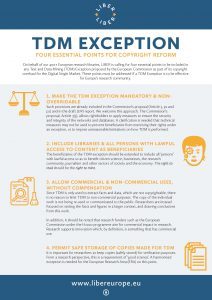Copyright Reform: Help Us Ensure an Effective TDM Exception!
Research libraries are closely watching the European Commission’s current work to reform copyright legislation because libraries and their users will be directly impacted by any changes to the law. Particularly interesting for libraries is a proposed new exception for Text and Data Mining (TDM) but numerous issues related to this potential exception still need to be addressed to ensure usability.
That’s why LIBER, together with fellow organisations such as CESAER, EUA, LERU, Science Europe and SPARC Europe, is currently working around the clock to raise awareness among EU policy makers about how a copyright exception on Text and Data Mining for research organisations must look, if it is to work for research libraries and their users. You can help too! In this article, we outline what changes are needed and what you can do to make sure our message is heard.
LIBER’s Four Key Demands
Our changes relate to a proposed new exception for TDM, which was outlined in the Proposed Directive on Copyright for the Digital Single Market. Research libraries were not included in the scope of the original proposal, although fortunately this now seems to be supported by the majority in both the Council and the European Parliament – the two institutions who are currently reviewing the proposal and who have equal power to decide over it.

In addition to ensuring research libraries are included in any TDM exception, LIBER is asking for four key improvements (as outlined below, and in this poster):
- Make the TDM Exception Mandatory and Non-Overridable – Such provisions are already included in the Commission’s proposal (Article 3, p1 and p2) and in the draft JURI report. We welcome this approach. The Commission’s proposal, Article 3(3), allows rightholders to apply measures to ensure the security and integrity of the networks and databases. A clarification is needed that technical measures may not be used to prevent beneficiaries from exercising their rights under an exception, or to impose unreasonable limitations on how TDM is performed.
- Include Libraries and All Persons With Lawful Access to Content as Beneficiaries
The beneficiaries of the TDM exception should be extended to include all ‘persons’ with lawful access so as to benefit citizen science, businesses, the research community, journalism and other sectors of society and the economy. The right to read should be the right to mine. - Allow Commercial and Non-Commercial Uses, Without Compensation – Since TDM is only used to extract facts and data, which are not copyrightable, there is no reason to limit TDM to non-commercial purposes. The copy of the individual work is not being re-used or communicated to the public. Researchers are instead focused on setting the facts and figures in a larger context, and drawing conclusions from this work. In addition, it should be noted that research funders such as the European Commission under the H2020 programme aim for commercial impact in research. Research supports innovation which, by definition, is something that has commercial use.
- Permit Safe Storage of Copies Made for TDM – It is important for researchers to keep copies (safely stored) for verification purposes. From a research perspective, this is a requirement of ‘good science’. A harmonised exception is needed for the European Research Area (ERA) on this point.
What’s Happened & What’s Next
In the original Proposed Directive on Copyright for the Digital Single Market, issued by the Commission in September 2016, research libraries were not included in the scope of a new exception for TDM. Fortunately, this now seems to be supported by the majority in both the Council and the European Parliament – the two institutions who are currently reviewing the proposal and have equal power to decide.
A number of relevant committees in the European Parliament have so far adopted opinions on the issue. It is now up to the lead committee of legal affairs (JURI) to decide what they think a renewed copyright legislation should look like. A draft report was issued in the spring and had almost 1,000 amendments. On TDM alone there were about 100 amendments.
A vote on these amendments might take place in the second part of November.
LIBER together with fellow organisations analysed all the proposed amendments related to TDM and provided a report to the relevant members of the European Parliament before the summer. Most recently LIBER signed an open letter focused on Open Access and another open letter on TDM, both of which were addressed to JURI.
There are many stakeholders with strong interests in the matter that are lobbying parliamentarians and asking for their support. Your voice counts too!
LIBER has also provided similar input to the Council working group members and to national ministries for research, innovation and competitiveness. Reliable sources suggest that research libraries are included in the scope of beneficiaries but there is strong reluctance to broadening it much further.
How Can Your Research Library Help?
- Contact members of the legal affairs committee (JURI) in the European Parliament from your constituency. Provide them with your input, ideally in your own language. Our Copyright Working Group has drafted a JURI-Members-Substitutes sample letter to MEPs which you can copy and adjust. Relevant JURI members are listed in in this PDF file. Any contact needs to made soon in that the vote, initially scheduled for the 10 October, will be postponed to later, most likely the week beginning 20 November.
- Contact national experts in the ministries for research and innovation in your country. Underline the importance of the points made above (or link to the poster listing our Four Essential Points). We suspect you best know who these people in are in your country. The timeframe here is also very short in that this topic most likely will be discussed early October. Our Copyright Working Group also has a sample letter for contacting national experts.
Thank you for your support!
Related news articles